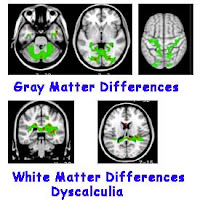Dyscalculia refers to a wide range of lifelong learning disabilities involving math. There is no single type of math disability. Dyscalculia can vary from person to person and it can affect people differently at different stages of life. It is related to dyslexia and includes difficulty in understanding numbers, learning how to manipulate numbers, learning math facts, and a number of other related symptoms. Unlike dyslexia however, very little is known about its prevalence, causes or treatment.
What is going on in the brain?
- Very little was known about how the brain represents mathematics until about the last 15 years or so
- Developmental dyscalculia is thought to be caused by a difference in brain function and/or structure, in areas of the brain associated with mathematics
- Studies either show less grey matter (brain cells), or less brain activity in a specific area of the brain known to process mathematics
- A recent brain imaging study showed less brain activity in parietal and frontal areas of the brain associated with mathematical cognition
- All of these studies show either less grey matter (brain cells), or less brain activity in a specific area of the brain known to process mathematics, the intra-parietal sulcus.
How many people are effected by Dyscalculia?
- 3-6% of the population are described as ‘purely’ dyscalculic
- 50-60% of dyslexic individuals also have difficulties with math
- The remaining 40-50% of dyslexics do not show signs of dyscalculia
2 major areas of weakness can contribute to math learning disabilities:
- Visual-spatial difficulties: result in a person having trouble processing what the eye sees
- Language processing difficulties: result in a person having trouble processing & making sense of what the ear hears
Symptoms:
- Poor understanding of the signs +, -, ÷ and x, or may confuse these mathematical symbols
- Difficulty with addition, subtraction, multiplication and division or may find it difficult to understand the words "plus," "add," "add-together."
- May reverse or transpose numbers
- Difficulty with times tables
- Poor mental arithmetic skills
- Inability to grasp and remember mathematical concepts, rules, formulae, and sequences
- May have trouble even with a calculator due to difficulties in the process of feeding in variables
Other difficulties:
- Making sense of what the ear hears
- Following sequential directions
- Dealing with the exchange of money
- Remembering specific facts and formulas for mathematical calculations
- Easily disoriented
- Learning abstract concepts of time & direction
- Poor sense of direction
There is no formal diagnostic test specifically for dyscalculia, however, tests are available online. Examples of testing available for dyscalculia are:
Quick Test: The quick test is a list of 24 questions regarding math, such as "I have never been able to do times tables" and "when people mention odd and even numbers I don't understand what they mean". If the test taker answers yes to half or more of the questions presented, then it is likely that he/she has a problem with mathematics that requires assistance or remediation.
Computer Testing: There is a computer test called the "Dyscalculia Screener" that was created by Professor Brian Butterworth of University College London in 2004. It measures both the speed and accuracy of student responses in order to figure out mathematical proficiency.
Comparative Testing: The comparative test is meant to be used with classes of school children. It offers a variety of mathematical tests meant to distinguish children who are having problems from those who are not. It is offered by Tony Attwood in his book "Tests for Dyscalculia."
Treatment:
- Find different methods to approach mathematical problems
- Use concrete answers to teach new skills instead of dealing with the abstract first
- Work with the student and encourage them to ask questions as they work
- Have all the tools you’ll need to work at hand
- Work in a place that has few, if any, distractions
- Tutoring
Overview:
Sources:
www.dyscalculia.org
www.mathematicalbrain.com
http://www.dyscalculia.me.uk/index.html


No comments:
Post a Comment